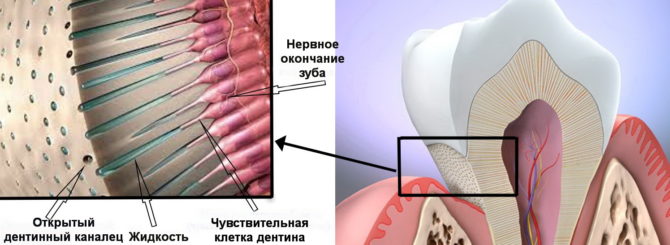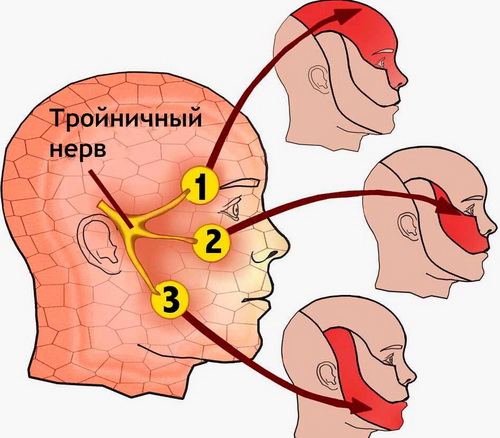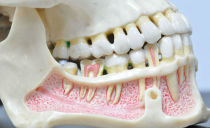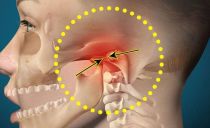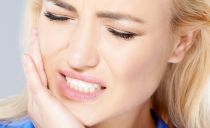Brings teeth and jaw: reasons and what to do
There are no nerve endings in tooth enamel, but sometimes it seems that it hurts. Such hypersensitivity (hyperesthesia) may be caused by thinning of enamel or other dental pathologies in which the dentinal tubules are exposed. Through them, food stimuli penetrate into the pulp, in which there are sensitive nerve endings - this is why some people bite their teeth.
Content
Manifestation of tooth sensitivity
Hypersensitivity of teeth manifests itself in different ways. Symptoms depend on the physiological features of the structure of the jaw, the nature of the pathology and the type of irritant that triggered the onset of pain. But there are general signs of this disease:
- point aching pain that quickly occurs and instantly subsides;
- the appearance of discomfort in the jaw area after taking certain foods: sweets, spicy foods or spirits;
- constant pain, which practically does not stop and is localized in a certain area of the oral cavity;
- the jaw reduces for no apparent external reason;
- aches are felt exclusively in molars.
If these symptoms occur, you should contact your dentist, because they not only cause discomfort, but also indicate the development of dental or internal pathologies.
Why reduces the jaw and teeth: possible causes
In some people, tooth enamel is thin from birth, in others - due to improper oral care, poor nutrition or internal diseases. Sometimes the problem can be solved with the help of special fluorinating pastes and dietary adjustments, but with serious pathologies you have to build up tooth enamel with artificial methods. That is why it is so important to determine the cause of the manifestation of hyperesthesia.
Caries and inadequate oral hygiene
The teeth of the lower and upper jaw can be reduced with insufficient hygiene of the oral cavity, when pathogenic microflora is not washed out of the mouth. Less often, the development of the disease leads to brushing with hard bristles or toothpaste, which contains the following substances:
- calcium carbonate;
- bicarbonate of soda;
- alumina.
The most common cause of toothache and aches is banal caries. As a result of the vital activity of pathogenic bacteria, tooth enamel is destroyed and thinned. Because of this, sensitive areas of the tooth are exposed - the dentinal tubules and pulp. The jaw reduces due to the fact that there is a nerve in the pulp that painfully reacts to external stimuli: water, food, cold air.
Enamel whitening
Teeth whitening in a dentistry clinic is accompanied by their processing with active chemicals that practically corrode enamel. To avoid this, it is necessary to comply with the doctor’s instructions, as well as prepare for whitening, having passed the course of preparatory and rehabilitation therapy.
If directly during the procedure for whitening enamel or immediately after its completion, the jaw clenched, do not worry.This is a completely natural phenomenon, pain and other unpleasant sensations subside within a few hours.
Rolls the jaw in a dream
Bruxism is the most obvious cause of hyperesthesia, because with frequent clenching of the jaws and grinding of teeth, enamel cracks and shrinks, which leads to its increased sensitivity.
The jaw can be reduced in a dream due to nerves: various stresses and emotional stresses. This is due to the fact that when a person is in a sleeping state, all the muscles of his body relax. And because of the stress state, an attack of bruxism can occur, which leads to a change in the position of the jaw and the occurrence of aching pain.
Headache and jaw dropping
When the head hurts and reduces the jaw at the same time, it is necessary to verify the absence of articular pathologies: arthritis, arthrosis and dysfunction of the mandibular joint. Such diseases are often accompanied by clicks when opening the mouth and chewing.
Acute pain in the temple, accompanied by aching in the jaw, may indicate a violation of blood circulation in the vessels. Most often, such a pathology occurs in people who lead a predominantly sedentary lifestyle. If the jaw reduces regularly, gymnastic exercises should be done, thanks to which the blood flow is normalized and muscle tone improves.
Enamel demineralization and malnutrition
Teeth can be reduced due to the demineralization of enamel, when useful substances are slowly washed out of it:
- calcium;
- potassium;
- magnesium;
- fluorine;
- phosphorus.
In this case, it is necessary to undergo a procedure for remineralization of teeth and start taking vitamin-mineral complexes.
Improper nutrition can lead to thinning of tooth tissue. For example, active acids in freshly squeezed juices corrode enamel, making it hypersensitive.
Trigeminal inflammation
The lower jaw can reduce due to inflammation of the trigeminal nerve. With this disease, short but intense bouts of headache are observed. Usually they last no more than half an hour. The pain extends to the entire dentition and chin.
Why the lower jaw reduces, only a doctor can determine. Inflammation of the trigeminal nerve is not the only reason for the manifestation of such a symptom, therefore, with the appearance of pain in the head and aching jaw, you need to quickly visit a dentist.
It reduces the jaw when yawning
Quite often, the jaw reduces due to the banal spasm of the jaw muscles when yawning. Sometimes the pain is supplemented by a small swelling of the tissues in the chin after yawning. Such symptoms may indicate jaw injuries, due to which decreased muscle tone.
For example, with a bruised chin, muscle trismus of the face can form. In this case, you need to urgently go to the doctor, and before visiting the clinic - try to yawn carefully, only slightly opening your mouth while yawning.
Why reduces the jaw and cheekbones
When it reduces the cheekbones and jaw, and after the attack appears aching pain, you must immediately consult a doctor. Simultaneous reduction of the jaw and cheekbones can be caused by serious pathologies:
- severe deficiency of blood supply - dizziness, impaired memory, vision, decreased mental activity, numbness of the extremities;
- hypertensive crisis - there is a heaviness in the chest, shortness of breath, numbness of the limbs and loss of sensitivity of the fingertips;
- tonsillitis - sore throat, difficult to swallow;
- oncological disease of ENT organs - lays ears, cramps occur.
It also reduces cheekbones on the face for completely harmless reasons, for example, due to frequent yawning. But it is better to play it safe and undergo examination by a specialist, so that, if necessary, start therapy at an early stage of the disease.
Diagnostic measures
The success of treatment depends on the quality of the diagnosis.First you need to understand why the jaw reduces, and only then proceed with therapy aimed at eliminating the underlying disease and unpleasant symptoms. Diagnosis of pain in the jaw includes a number of actions:
- standard dental examination;
- interrogation of the patient for localization, duration, intensity, regularity and time of occurrence of pain (only in a dream or exclusively in the daytime);
- general analysis of blood and urine;
- radiography of the skull and problem area of the jaw;
- CT scan;
- MRI of the head and cervical spine.
Further examination is prescribed depending on the situation. If, as a result of studies, pathologies of not only dental nature are revealed, the patient will be referred to the appropriate specialist:
- jaw surgeon;
- neurologist;
- cardiologist;
- to the traumatologist.
What to do if it reduces the jaw and teeth
After the diagnosis is established, complex therapy begins, aimed at eliminating the cause of the pain. The tactics of treatment depend on the nature of the pathology:
- Dislocation of the jaw must be corrected, in case of a fracture, an emergency operation is necessary.
- If the cause of spasm of the jaw muscles is a disease of the cardiovascular system, it is necessary to undergo comprehensive treatment under the supervision of a cardiologist.
- If pain in the jaw occurs due to a dental disease - deep caries, pulpitis, periodontitis - antibiotic therapy may be needed. A diseased tooth is either removed or filled.
If the jaw reduces stress and stress, you need to temporarily protect yourself from nervous situations. A relaxing massage and a decoction of soothing herbal remedies are indicated. In severe pathology, the doctor may prescribe a sedative; in severe pain, anesthetics are used.
If you know for sure that the jaw has been reduced due to psychopathology, you can do various baths and compresses (not hot) before bedtime to relax the muscles of the face and normalize the general condition of the body.
Pain in the jaw is a serious sign that requires a comprehensive examination and the use of effective therapeutic methods of treatment. If you treat not the cause of the disease, but the symptoms, irreversible changes in the body may occur.


